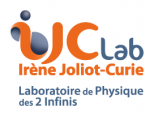
The hall of the Andromède accelerator is in full activity at the end of 2021. Three experiments are being set up there, STELLA, NanoCR and New JEDI. New JEDI is the acronym for New Judicious Experiment for Dark sectors Investigations. This is a scientific project supported by an international collaboration bringing together many laboratories: IJCLab (FR), GANIL (FR), University of Minnesota (US), NPI (CZ), LNS (IT), IAP (FR) and others. The first scientific objective of New JEDI is to confirm or deny the anomaly observed in the decay spectrum of the resonance at 18.15 MeV of 8Be by a team from MTA Atomki (HU). It results experimentally by the observation of an excess of counts at large angles (around 140°) between the electron and the positron emitted in pairs as a result of this decay. Since the process of creating electron-positron pairs by internal conversion does not allow the data to be described, the hypothesis that this anomaly is the signature of a Dark Boson has been raised and has led to much discussion within the international scientific community. In this hypothesis, this Dark Boson would act as the messenger of a fifth force of the Universe, and it would allow the interaction between ordinary matter (that which composes us but also the stars, the planets etc.) and the black sectors of the universe. In other words, if confirmed, this unexpected result could well be the first evidence for a new light gauge boson (mass estimated experimentally at 16.7 (6) MeV). It is therefore worth testing it by independent measurements, led by a new team, with a new instrument and with another accelerator. The first test experiments which were carried out in 2018 at ARAMIS-SCALP in Orsay made it possible to define the technology and geometry of the dedicated New JEDI device, then the necessary electronic developments, mounting and assembly were carried out at GANIL. The commissioning of the whole was carried out with the 3MV tandetron located in Rez (CZ) last June-July.
Since the beginning of November, New JEDI has been in Orsay, near Andromède, which is one of the rare accelerators in Europe to be able to deliver proton beams with the energies (from 440 keV up to 1.2 MeV) and high intensities (1 𝜇A) necessary for the project.
The assembly of the New JEDI detectors and the experimental preparation work were completed on schedule thanks to the support of the local teams and that of our Czech and Italian collaborators who have rotated over the last 4 weeks, making it possible to respect the sanitary rules.
The technical solutions for the adaptation of New JEDI to the Andromède line and the production of new scintillator detectors (with adapted geometry and improved resolution) are being developed in consultation with our colleagues from the mechanical department of the engineering division. Data collection is expected to take place in early 2022, and will last over a month. Then, New JEDI will go to GANIL to carry out other, more general studies on the existence of a Dark Boson of a few tens of MeV in other quantum systems with SPIRAL2-NFS. Beyhan Bastin, scientific coordinator of New JEDI, will give a general public conference on the subject at IJCLab soon.
IJCLab correspondents and co-spokespersons for New JEDI: I. Deloncle for the Nuclear Physics pole and Jurgen Kiener for the A2C pole.






